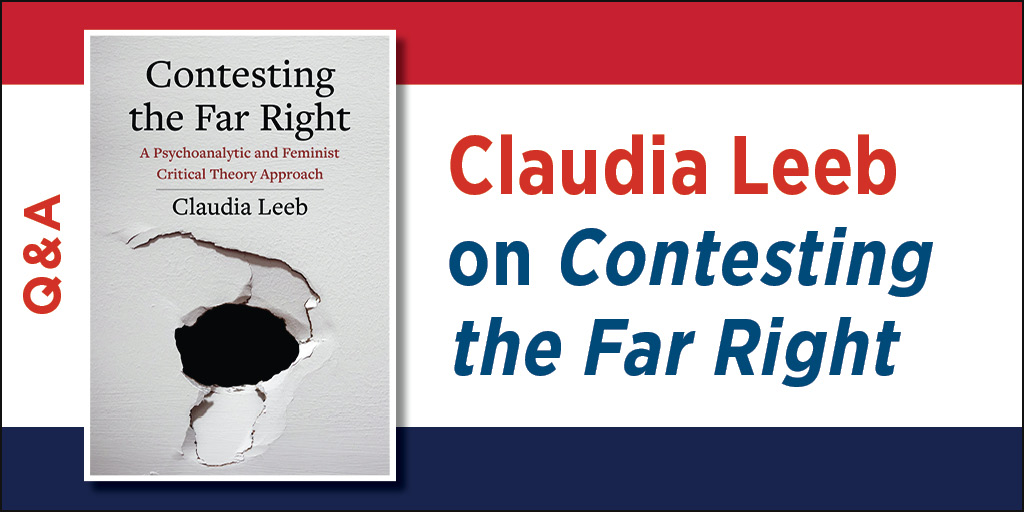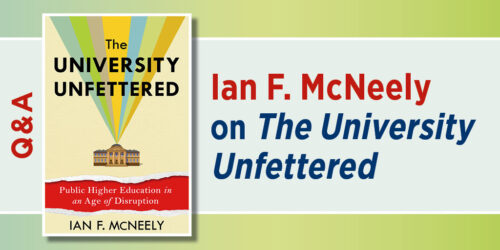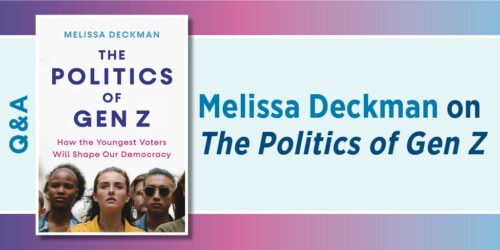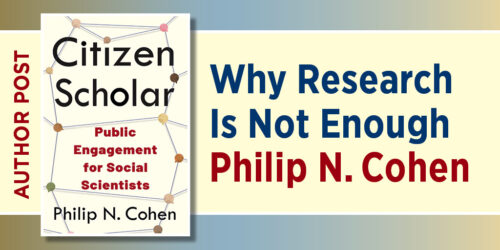Claudia Leeb on Contesting the Far Right

In Contesting the Far Right: A Psychoanalytic and Feminist Critical Theory Approach, Claudia Leeb argues that psychoanalytic and feminist critical theory illuminate how economic and psychological factors interact to produce an extreme political shift to the far right. She examines right-wing recruitment tactics in the United States and Austria, where people discontented with the status quo have turned to far-right parties and movements that further cement capitalism’s adverse effects. In this Q&A, Leeb discusses how a psychoanalytical approach provides unique insight into far-right propaganda and recruitment tactics and offers advice on resisting the far right’s appeal.
Q: Could you tell us a little about your background and how you came to embrace a psychoanalytic and feminist critical theory approach and study the far right in the United States and Austria?
Claudia Leeb: I have a background in psychology from the University in Vienna, Austria, where I am originally from. I also have a background in political theory with a focus on critical and feminist theory from the New School for Social Research in New York City. In my work, I combine these theoretical traditions to analyze pressing political problems, including the rise of the far right. As an Austrian living in the United States, with its rising anti-immigrant sentiments since Trump’s election in 2016, I became interested in studying the recruitment tactics of Trump and the alt-right. My previous book, The Politics of Repressed Guilt (2018), which shows how Austria’s failed working through its Nazi past makes it more likely that people repeat such a past, made me interested in studying the recruitment tactics of the Austrian Freedom Party and the Identitarian movement.
Q: Could you explain why a psychoanalytical approach to contesting the far right is so important?
Leeb: Psychoanalytic theory helps explain the contradiction that people discontented with the status quo turn to far-right parties and movements that further cement capitalism’s adverse effects, which are growing economic insecurity, exploitation, alienation, and isolation. However, the growing presence of the far right today is not a psychological problem but a socioeconomic and political problem. But because the far right’s destructive aims contradict people’s rational socioeconomic and other self-interests, its propaganda must be oriented psychologically—it has to mobilize irrational, unconscious, and regressive processes in people to win their support. Psychoanalysis helps us understand how far-right propaganda tactics mobilize such processes.
Q: Could you explain how such psychologically oriented propaganda tactics function to recruit people and why you think we must pay attention to people’s subjectivity?
Leeb: In today’s precarity capitalism, it has become difficult for most people to live up to economic, interpersonal, and bodily success standards. As a result, people have heightened anxieties around their nonwhole subjectivities with accompanying feelings of failure. Psychologically oriented far-right propaganda techniques are effective because they engender in people regressive processes that provide them with the illusion they are whole subjects again, which helps them to get rid of feelings of anxiety and failure. Meanwhile, the objective conditions of suffering in capitalism that generated people’s heightened anxieties remain intact. Moreover, the same processes that make people feel better about themselves also remove those mental barriers that keep people’s aggression and their repressed racist and sexist attitudes in check, which the far right can now redirect toward its chosen foes.
Q: Can you elaborate on the particular effects that these far-right techniques have upon white men?
Leeb: White men from all classes have heightened anxieties and feelings of failure around their subjectivities in precarity capitalism because people expect them to have economic, interpersonal, and bodily success. Feminist decolonial theory shows us that some of these expectations stem from the colonial era, where colonialists introduced the idea that white men are superior to minorities and women and, therefore, ought to be on the top of the economic hierarchy. Since it has become difficult for white men to live up to the economic, interpersonal, and bodily success standards in precarity capitalism, they are particularly vulnerable to far-right recruitment tactics that promise them an illusory wholeness and that allow them to get rid of feelings of anxiety and failure.
Q: Could you tell us what you found when examining the Austrian Freedom Party and the Identitarian movement using a psychoanalytical framework?
Leeb: My analysis shows that a failed working-through of feelings of guilt and loss about Austria’s recent National Socialist past makes people vulnerable to far-right propaganda techniques that promise their followers that they can close the books on their past. I also show that such tactics are particularly effective in precarity capitalism. I analyze a documentary that interviews teenagers and their (grand-)parents in the aftermath of a violent attack by teenagers on survivors of a former concentration camp in Upper Austria who visited the camp at the yearly memorial. My analysis shows how a failed-working through of the past is carried from generation to generation. If the grandparents’ and the parents’ generations aim to forget the past instead of dealing with feelings of guilt and loss, then their children are more prone to join neo-Nazi groups and repeat the cycle. My analysis is here also crucial for the United States, which has yet to work through the genocide of its Indigenous population and the enslavement of Africans.
Q: Could you tell us about the culture industry and its effects on people, making them more vulnerable to falling for far-right propaganda tactics?
Leeb: In the mid-twentieth century, when early Frankfurt School critical theorists introduced this term, the culture industry referred to Hollywood films, television shows, radio broadcasts, and print periodicals. Today it predominantly refers to the internet and social media. The culture industry produces subjects more prone to fall for far-right propaganda because it inhibits people’s ability to think critically and imagine anything beyond what the culture industry prescribes. Today people spend more time on the internet, and the internet-savvy far right makes use of that by invading non-far-right platforms to recruit new followers with its propaganda tactics.
Q: You explain in your book how the alt-right uses the culture industry of racist and sexist jokes to recruit followers. Could you explain the psychoanalytic mechanism behind that?
Leeb: In the book I show that tendentious jokes generate vast amounts of pleasure in us because they temporarily lift the inhibition of our aggressive and libidinal drives. While the listener to the joke might initially not harbor any conscious racist and sexist tendencies, they become bribed with an easy yield of pleasure into taking sides with the maker of the joke because it allows them feel as a whole subject again. Furthermore, to avoid upsetting the pleasure derived from tendentious jokes and their illusion of wholeness, there’s an incentive for the follower not to critically reflect on the content of such jokes. However, the same processes that allow the listener to feel as a whole subject again also makes their unconscious attitude predominate, which allows the alt-right to better manipulate the follower for its destructive political goals.
Q: What are some suggestions in your book to undermine the far right’s appeal?
Leeb: I introduce the idea of a “subject in outline” to counter far-right propaganda techniques. It means that instead of striving for wholeness, we embrace that we never can become whole. Once people embrace that they are fundamentally nonwhole, they can better curb the compulsion to achieve wholeness. Then psychoanalytically oriented propaganda devices that promise wholeness become less effective. We must also create embodied reflective spaces where people can work through guilt and loss about a nation’s violent past. At the same time, we also must challenge the standards of economic, interpersonal, and bodily success that make people feel anxious and prone to feelings of failure. Finally, we must do away with capitalism, which generates the objective and subjective forms of suffering upon which far-right propaganda preys.








